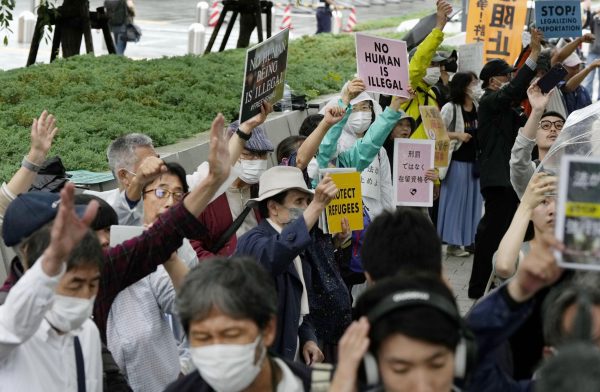In 2022, the Japan International Cooperation Agency outlined that Japan would need over 6.7 million foreign workers by 2040 to maintain an economic output aligned with the government’s GDP growth targets. This represents a roughly four-fold increase from current levels. Kishida re-started the large-scale admission of foreign workers in Spring 2022, following a relaxation of pandemic-related border restrictions. Yet, he has been hesitant to outline a broader vision for the long-term admittance and potential integration of migrant workers.
The reluctance to implement a formal immigration policy has long precedence among Japanese policymakers. For example, when presenting the 2018 amendment to the Immigration Control Act, the late former prime minister Shinzo Abe stated that ‘Japan would not adopt a so-called immigration policy’. Instead, the amendments established the Specified Skilled Worker (SSW) system, which aims to boost foreign worker admittance within 12 economic sectors suffering from acute labour shortages.
Japan has long relied on immigration ‘side doors’ — pathways to admit primarily lower skilled foreign workers while legally denying their presence. These channels have historically included the generous admittance of people of Japanese descent, with the Abe years seeing a rapid increase in the numbers of working international students and participants in the Technical Intern Training Program (TITP). But these ‘side doors’ have also been subject to criticism for placing foreign workers in vulnerable labour environments.
While the SSW system requires that workers pass an industry aptitude test and imposes some language requirements, the industries which the system serves and the institutions which govern it strongly overlap with the TITP. Unsurprisingly, the SSW system essentially functions as a way for employers to retain technical interns, with roughly 70 per cent of specified skilled workers coming from the TITP.
As it pertains to foreign workers, Kishida has so far opted to maintain the status quo set by Abe, preferring to adjust Japan’s primary admittance policies instead of implementing major reform. In June 2023, his cabinet passed an expansion of the SSW Residence Status Two, which allows for unlimited renewals and family reunification. While this provides an effective path to long-term settlement for lower skilled workers, the expansion has been essentially non-functional, with only 12 SSW Two status holders as of June 2023.
While the Kishida government expanded the acceptable industries that foreign students graduating from vocational schools can find employment in, one of the most significant changes may lie in the future of the TITP, which is being reviewed by a Ministry of Justice appointed panel. Currently, the TITP works under the pretext of facilitating ‘skills transfer’ to developing countries, though analysts argue that it more closely resembles a rotational migrant worker system.
The TITP has also been criticised on human rights grounds, with many ‘interns’ incurring debt to access the program and facing heavy restrictions in changing employers. The panel has suggested that the TITP be renamed and formalised as an entry point to the SSW system, abandoning the pretext of ‘skills transfer’ and making it easier for workers to change employers. This proposal is yet to be adopted into policy.
The Kishida administration has opted for incrementalism on immigration. While Kishida has mentioned the need to ‘consider a society featuring co-existence with foreigners’, he has generally avoided the topic in major policy speeches, as there is simply no political necessity for him to do otherwise. If current systems are sufficient for Japan to address its labour shortages, it is unnecessary to open the potential can of worms that a national conversation on immigration would represent. Still, the absence of a formal immigration policy means that foreign workers will continue to suffer from subpar policy outcomes.
Japan has a structural demand for foreign workers, but one major question going forward is whether there is sufficient supply. The countries from which foreign workers migrate, such as Vietnam, have experienced strong post-pandemic economic growth while the Japanese yen has weakened and wages have stagnated. As such, Japan’s attractiveness as a destination country for foreign workers has diminished.
Broader regional trends suggest that foreign labour migration to Japan will not continue to increase indefinitely and the potential effects of this will be felt by a future administration. One way to address a potential bottleneck in foreign labour supply is to boost Japan’s attractiveness by improving labour conditions, expanding pathways to permanent residence and family reunification and integrating foreigners into Japanese society — considerations that a formal immigration policy could address. But despite recent calls to pass a national ‘Immigration Act’, it is unlikely that the Kishida administration will do so. Until such a time, Kishida’s incrementalism looks set to continue.
Maximilien Xavier Rehm is a PhD Candidate at the Graduate School of Global Studies, Doshisha University. His research focuses on the politics of immigration in Japan.


Mass immigration to Japan will destroy social cohesion and increase crime, just as it has done in the West. A few extra GDP points may be great for executives and corrupt politicians, but it is the common people that will have to face the chaos that follows. Besides, a country is more than just a GDP number; it is the homeland of a people. Flooding the country with immigrants while the native Japanese population is in severe decline does not make sense.